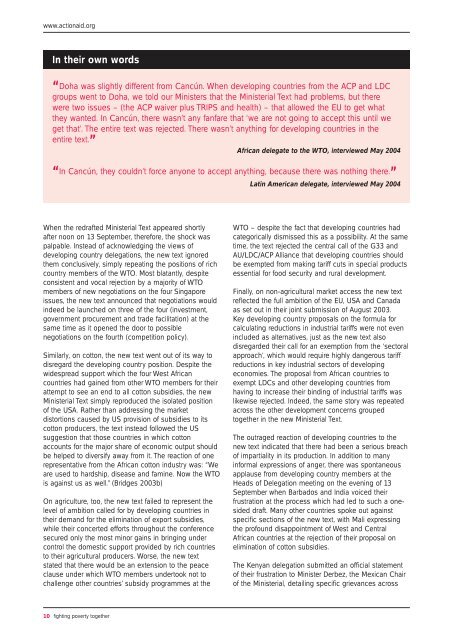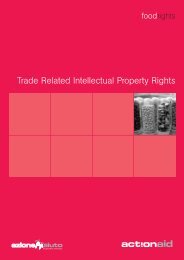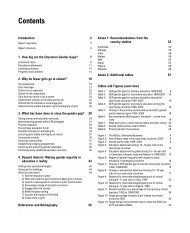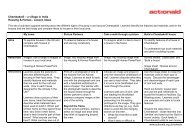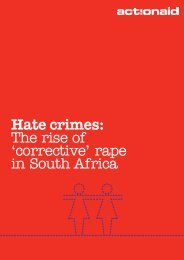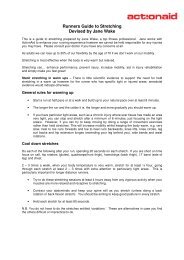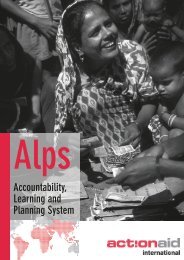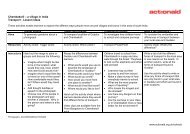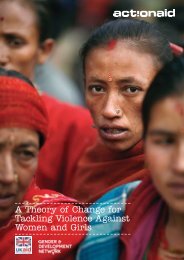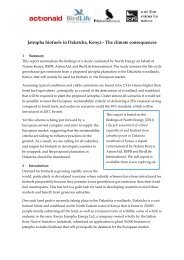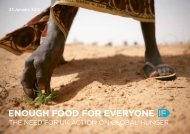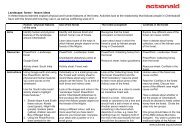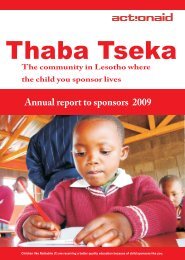Divide and Rule: - ActionAid
Divide and Rule: - ActionAid
Divide and Rule: - ActionAid
You also want an ePaper? Increase the reach of your titles
YUMPU automatically turns print PDFs into web optimized ePapers that Google loves.
www.actionaid.orgIn their own words“Doha was slightly different from Cancún. When developing countries from the ACP <strong>and</strong> LDCgroups went to Doha, we told our Ministers that the Ministerial Text had problems, but therewere two issues – (the ACP waiver plus TRIPS <strong>and</strong> health) – that allowed the EU to get whatthey wanted. In Cancún, there wasn’t any fanfare that ‘we are not going to accept this until weget that’. The entire text was rejected. There wasn’t anything for developing countries in theentire text.”African delegate to the WTO, interviewed May 2004“In Cancún, they couldn’t force anyone to accept anything, because there was nothing there.”Latin American delegate, interviewed May 2004When the redrafted Ministerial Text appeared shortlyafter noon on 13 September, therefore, the shock waspalpable. Instead of acknowledging the views ofdeveloping country delegations, the new text ignoredthem conclusively, simply repeating the positions of richcountry members of the WTO. Most blatantly, despiteconsistent <strong>and</strong> vocal rejection by a majority of WTOmembers of new negotiations on the four Singaporeissues, the new text announced that negotiations wouldindeed be launched on three of the four (investment,government procurement <strong>and</strong> trade facilitation) at thesame time as it opened the door to possiblenegotiations on the fourth (competition policy).Similarly, on cotton, the new text went out of its way todisregard the developing country position. Despite thewidespread support which the four West Africancountries had gained from other WTO members for theirattempt to see an end to all cotton subsidies, the newMinisterial Text simply reproduced the isolated positionof the USA. Rather than addressing the marketdistortions caused by US provision of subsidies to itscotton producers, the text instead followed the USsuggestion that those countries in which cottonaccounts for the major share of economic output shouldbe helped to diversify away from it. The reaction of onerepresentative from the African cotton industry was: “Weare used to hardship, disease <strong>and</strong> famine. Now the WTOis against us as well.” (Bridges 2003b)On agriculture, too, the new text failed to represent thelevel of ambition called for by developing countries intheir dem<strong>and</strong> for the elimination of export subsidies,while their concerted efforts throughout the conferencesecured only the most minor gains in bringing undercontrol the domestic support provided by rich countriesto their agricultural producers. Worse, the new textstated that there would be an extension to the peaceclause under which WTO members undertook not tochallenge other countries’ subsidy programmes at theWTO – despite the fact that developing countries hadcategorically dismissed this as a possibility. At the sametime, the text rejected the central call of the G33 <strong>and</strong>AU/LDC/ACP Alliance that developing countries shouldbe exempted from making tariff cuts in special productsessential for food security <strong>and</strong> rural development.Finally, on non-agricultural market access the new textreflected the full ambition of the EU, USA <strong>and</strong> Canadaas set out in their joint submission of August 2003.Key developing country proposals on the formula forcalculating reductions in industrial tariffs were not evenincluded as alternatives, just as the new text alsodisregarded their call for an exemption from the ‘sectoralapproach’, which would require highly dangerous tariffreductions in key industrial sectors of developingeconomies. The proposal from African countries toexempt LDCs <strong>and</strong> other developing countries fromhaving to increase their binding of industrial tariffs waslikewise rejected. Indeed, the same story was repeatedacross the other development concerns groupedtogether in the new Ministerial Text.The outraged reaction of developing countries to thenew text indicated that there had been a serious breachof impartiality in its production. In addition to manyinformal expressions of anger, there was spontaneousapplause from developing country members at theHeads of Delegation meeting on the evening of 13September when Barbados <strong>and</strong> India voiced theirfrustration at the process which had led to such a onesideddraft. Many other countries spoke out againstspecific sections of the new text, with Mali expressingthe profound disappointment of West <strong>and</strong> CentralAfrican countries at the rejection of their proposal onelimination of cotton subsidies.The Kenyan delegation submitted an official statementof their frustration to Minister Derbez, the Mexican Chairof the Ministerial, detailing specific grievances across10 fighting poverty together


